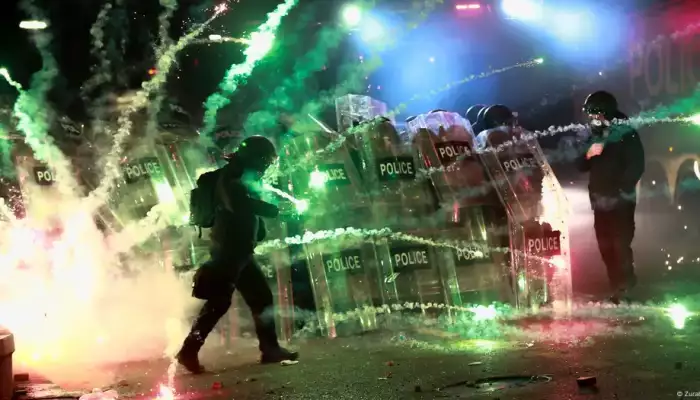
Police in the former Soviet republic of Georgia on Saturday said they had arrested 107 people in the capital, Tbilisi, amid overnight protests.
Thousands of people gathered again across Georgia on Saturday for the third night of protests.
The demonstrations, in response to the government's suspension of accession talks with the EU, were said to be the largest in recent weeks after the ruling Russia-friendly Georgian Dream party's disputed win in October's parliamentary elections.
Why did the arrests take place?
Thousands of protesters had gathered in Tbilisi on Friday evening and again on Saturday. On Thursday, the country's outgoing president, Salome Zourabichvili, joined protesters and accused the government of declaring "war" on its own people in cracking down on demonstrations.
Speaking with DW on Saturday, Zourabichvili not only denounced the use of a water cannon and arrests but also what she called "systemic violence against protesters." She said the violence mirrors a previous wrong committed against the Georgian voters when they were "deprived of a voice in the elections."
President says she won't stand down
Zourabichvili branded the country's parliament illegitimate and said the only legitimate institution in the country right now is the presidency. As such, she said on Saturday that she does not intend to leave her post when her term ends in December.
Georgia's Interior Ministry has said the protests had "exceeded the norms set by the law for assemblies and rallies."
The ministry claimed the demonstrators had thrown stones at police officers and burned objects. Police fired tear gas and a water cannon at the protesters as they gathered on Rustaveli Avenue, Tbilisi's main street.
The demonstrators built improvised barricades and set off fireworks.
Pro-EU rallies were also reported from Batumi, Sugdidi, and other cities across the country. It is believed that arrests were also made in Batumi, Georgia's second-largest city.
Zourabichvili told DW that the scale of the protests was new, having spread to every major city in the country for the first time. She also noted that numerous public-sector employees had begun signing protest letters as well as resigning from their posts, emphasizing that this included some in the diplomatic corps.
Why are there demonstrations in Georgia?
The ruling Georgian Dream party said on Thursday that the country would suspend talks on European Union accession until 2028. It also refused budgetary grants from Brussels — effectively halting its application to join the bloc for the next four years.
That move bolstered opposition to the Georgian Dream party remaining in power after the disputed election, with the opposition fearing that the country was turning away from Europe — and allowing Russia more influence in Georgia again.
The US State Department on Saturday said it suspended its strategic partnership with Georgia after the Georgian Dream party suspended talks for accession to the European Union.
"We condemn excessive force used against Georgians rightfully protesting this betrayal of their constitution — EU is a bulwark against Kremlin," State Department spokesperson Matthew Miller wrote on X. "We have therefore suspended our Strategic Partnership with Georgia."